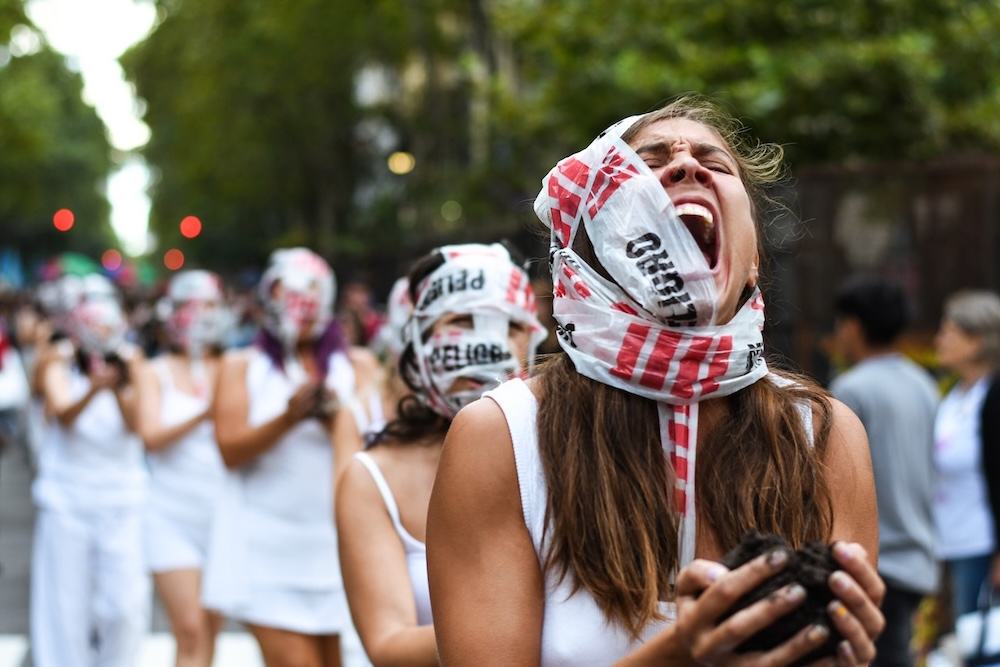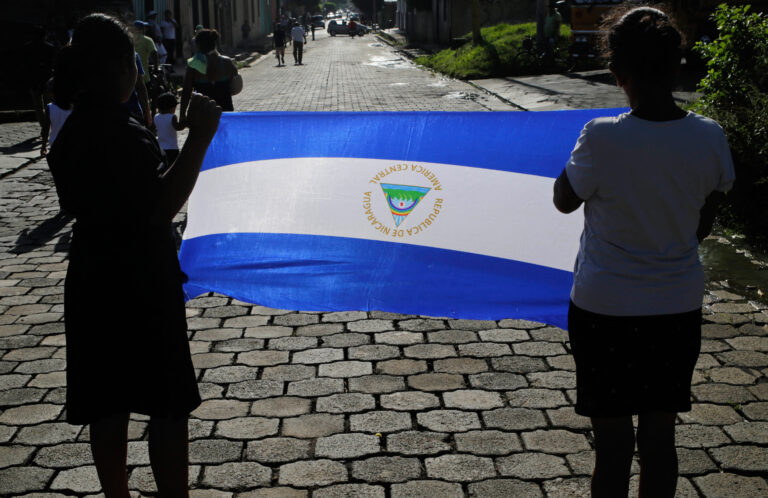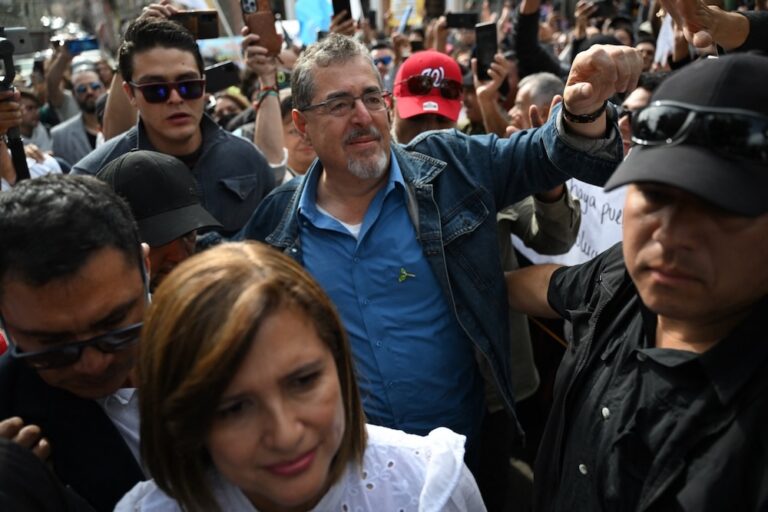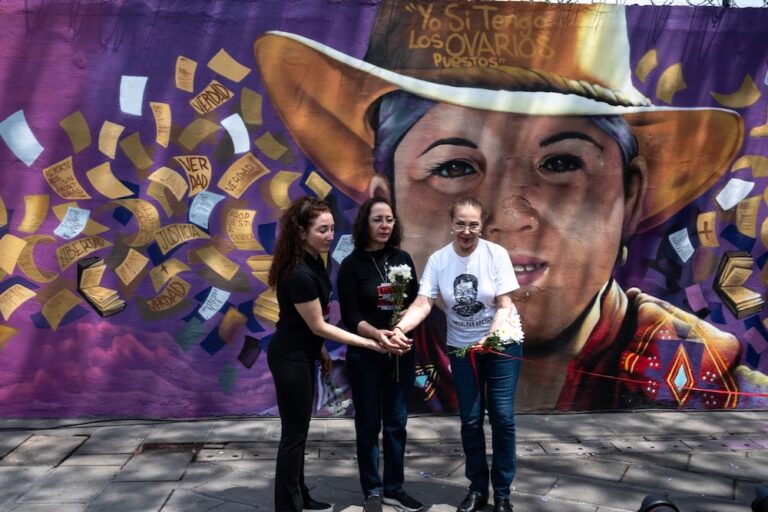Americas: A free expression and civic space round-up produced by IFEX's Regional Editor Laura Vidal, based on IFEX member reports and news from the region.
Across Latin America, recent legislative reforms and political decisions are undermining key freedoms. From Mexico to Peru, new laws are threatening transparency, privacy, and the autonomy of civil society organisations. Meanwhile as attacks on journalists and press freedom continue to escalate, women across the region reaffirmed their right to protest, organise, and inform – both on the streets and online.
Women’s rights defended online and in the streets
Across Latin America, civil society marked International Women’s Day with actions highlighting both ongoing threats to women’s rights and the many ways in which women continue to resist and demand justice – online and offline.
In Mexico, ARTICLE 19 Mexico and Central America and the Rompe el Miedo network activated their monitoring efforts during 8 March protests to ensure women’s right to protest was respected across several cities. Other network members launched reports and conversations dedicated to women’s rights and freedom of expression.
In Argentina, the Foro de Periodismo Argentino (FOPEA) presented the findings of Periodistas Amenazadas: investigar para protegerlas (Threatened Journalists: Researching to Protect Them), a multi-case study documenting the professional experiences of women journalists and the violence they routinely face in their work. FOPEA also announced a free-access training series aimed at fostering safer and more equitable media environments, to be held in April.
In Paraguay, the Sindicato de Periodistas del Paraguay (SPP) convened a series of discussions on gender representation in the media, coverage of gender-based violence, and inclusive journalism practices. These included a workshop on gender-sensitive reporting, focused on recognising and avoiding bias in news coverage.
In Colombia, Fundación Karisma drew attention to a growing digital challenge: access to reliable information on abortion rights. Despite the decriminalisation of abortion two years ago, many women remain unaware that abortion is not a crime. “Women need quality and timely information to fully exercise this right,” said Catalina Moreno, Karisma’s co-director in their X space. As explained by Moreno, Karisma has received reports of content being removed or down-ranked online – particularly from groups providing reproductive health information. Legal abortion clinics in Colombia and other Latin American countries have also faced barriers accessing Google Ads services, which currently only certify abortion providers in the United States, Ireland, and the UK.
From another angle, Derechos Digitales published a special feature analysing the situation in Venezuela, El Salvador and Nicaragua, where state repression has had a disproportionate impact on women – especially those at the intersection of multiple vulnerabilities. Journalists, human rights defenders, and LGBTQI+ individuals face persecution and criminalisation, in contexts where gender-based violence is exacerbated by militarised policing and political crackdowns. The fight, however, continues on and has expanded to the whole region:
“Whether in public or private, whatever the form of our protest, we do it for all women and girls, for gender diversity, for equality, and for the effective guarantee of our rights. Our effort is collective, and we will continue until dignity becomes customary for all women, in all territories.”
Mexico: Legislative reforms undermine transparency and data protection
Mexico’s legislative branch has approved reforms that significantly weaken the institutional framework protecting the rights to transparency, access to information, and personal data protection. According to R3D, the newly approved laws “represent a significant step backwards” in safeguarding the rights to information and data protection. The elimination of an autonomous oversight body raises serious concerns about future transparency and accountability, as well as the increased grounds for withholding information of public interest.
ARTICLE 19 Mexico and Central America also denounced the lack of public consultation throughout the legislative process, despite repeated calls by civil society, journalists, and human rights defenders for an open parliamentary debate. “In less than a month,” ARTICLE 19 stated, “more than 20 years of work to build a robust institutional framework for transparency, access to information, and data protection have been dismantled.”
R3D further warned that the new General Law on the Protection of Personal Data Held by Obligated Entities excludes unions and any individuals or legal entities receiving public funds or exercising authority from being subject to its provisions. This redefinition weakens the scope of data protection by reducing the number of actors legally bound to safeguard personal information. Moreover, unlike the previous law, the reform does not establish an independent body to oversee data protection.
These are not the only worrying legislative developments civil society in Mexico is watching out for. On 13 February, President Claudia Sheinbaum introduced two legislative initiatives in the area of public security and intelligence: the General Law on the Public Security System and the Law on the National Intelligence and Investigation System on Public Security. While presented as tools to combat insecurity, R3D warned that both proposals contain provisions that seriously threaten people’s privacy, safety and rights.
One of the most alarming measures is the proposed creation of a centralised digital platform registering all mobile phone users, linked to official IDs such as the CURP or the taxpayer identification number (RFC). R3D also calls attention to how this registry seems to echo the failed Registro Nacional de Usuarios de Telecomunicaciones (RENAUT), created in 2008 and dismantled in 2011 after its database was leaked and sold on the black market.
R3D flagged the risks of establishing a massive, mandatory and centralised database without judicial oversight, managed by authorities who, due to the elimination of the INAI (the federal data protection agency), would operate without professional or independent supervision. “There are no safeguards in place, such as a requirement to notify affected individuals in case of a breach,” the organisation stated.
These concerns are compounded by the high levels of insecurity in the country and the frequent collusion between criminal groups and municipal, state or even federal authorities. In this context, access to such a platform could be weaponised to harm the very population it claims to protect. The recent hacking of President Sheinbaum’s own phone has further underscored the dangers of weak data security protocols.
Peru: Crackdown on NGOs amid rising threats to press freedom
Peru’s Congress has passed a controversial law that civil society across the region has denounced as unconstitutional, arguing that it violates the rights to freedom of association, thought, and political participation. The law was passed under the pretext of strengthening oversight of international funds received by non-governmental organisations (NGOs).
The reform modifies the legal framework of the Peruvian Agency for International Cooperation (APCI), a government agency, granting it broad powers to control and sanction NGOs that receive international aid.
The Instituto Prensa y Sociedad (IPYS) publicly rejected the law as well. It warned that the intrusion proposed by the reform is incompatible with the private nature of NGOs under Peru’s constitutional framework, and bears a striking resemblance to laws enacted by authoritarian regimes elsewhere in Latin America. “This law establishes a kind of control characteristic of police states,” IPYS stated. NGOs may have their registration cancelled on the basis of vaguely defined actions said to affect “public order, citizen security, national defence, or internal order.” In addition, the law indiscriminately categorises all NGOs as obligated entities under the national anti-money laundering regime.
While the reform’s language focuses on misuse of funds, IPYS warned that its underlying purpose is not financial accountability but ideological and political control over civil society.
The passing of this law comes amid an increasingly hostile environment for press freedom in Peru. Following a fact-finding mission to the country, the Inter American Press Association (IAPA) expressed concern about the “serious deterioration” of press freedom and freedom of expression in the context of ongoing political and institutional crises ahead of the 2026 general elections.
The IAPA delegation documented growing hostility toward independent media, judicial harassment of critical journalists, and the systematic use of disinformation and online attacks – all of which contribute to a climate that endangers journalists and undermines the public’s right to be informed.
In January, journalist Gastón Medina was murdered in the Ica region. The lack of meaningful progress in the investigation, as well as reported efforts from authorities to prevent its journalistic coverage, not only reflect a pattern of impunity, but also serve as stark evidence of the escalating violence.
In Brief
- Mexico: Journalist and lawyer Raúl Irán Villareal Belmont was found murdered on 13 March in Guanajuato, one of the most dangerous states for the press.
- Argentina: FOPEA demanded an investigation into the critical injury of photojournalist Pablo Grillo, who was hit by a tear gas canister during a protest near Congress.
- Honduras: ARTICLE 19 Mexico and Central America condemned the use of criminal defamation charges by public officials to censor the press. On 17 March, the Ministry of Finance filed a complaint against Radio Cadena Voces (RCV).
- Guatemala: International organisations called for the release of journalist José Rubén Zamora and urgent due process guarantees after his house arrest was revoked on 4 March.
- Venezuela: Local digital rights organisation Ve Sin Filtro recorded 949 website blockages and published in a new report featuring the work of IPYS Venezuela and Espacio Público exposing official censorship and digital repression around the 2024 presidential elections.



